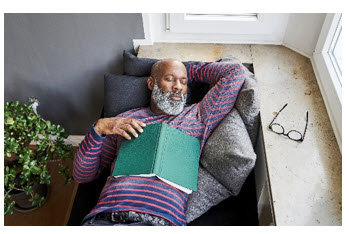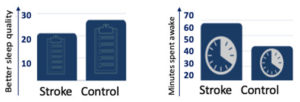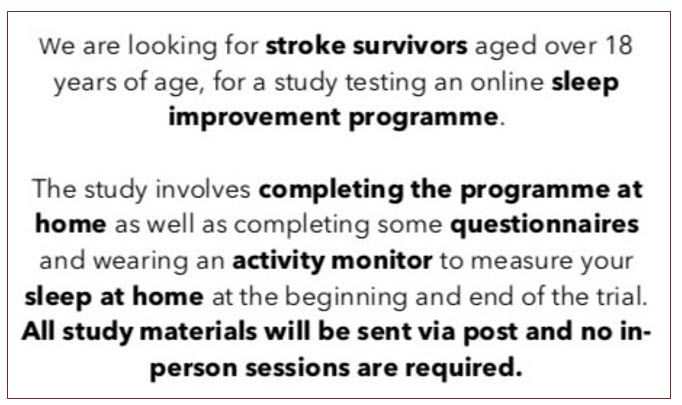Are you a stroke survivor who is struggling to sleep? If so, you are not alone.
Research has found that sleep problems are much more common for stroke survivors, compared to in the general population. This is an issue because sleep is so important for many reasons. A lack of sleep can have a negative impact on our mood, reduce our alertness and concentration and can even affect our learning of things, including motor skills.

Researchers led by Professor Heidi Johansen-Berg, together with the Oxford Centre for Enablement and the Oxfordshire Stroke Rehabilitation unit, looked at sleep quality in 59 brain injury and stroke patients in rehabilitation units. They found that those who had a better sleep quality saw greater improvements throughout their rehabilitation. Patients with better sleep showed less overall movement impairment in their affected arm and legs and were more mobile when they were discharged from hospital.
 Professor Johansen-Berg and Dr Fleming have expanded this study, assessing stroke survivors in the community.
Professor Johansen-Berg and Dr Fleming have expanded this study, assessing stroke survivors in the community.
In total, 70 stroke survivors and 76 people who hadn’t had a stroke took part, by answering questions about their sleep and wearing an activity monitor at home. Some had experienced stroke fairly recently (within the past year), whereas others had their stroke many years prior to taking part in the study.
Similar to what they found for people in hospital, stroke survivors rated their sleep as significantly worse than people who hadn’t had a stroke, and spent more time awake overnight.
 This did not seem to relate to how long it was since the stroke occurred, leading researchers to conclude that sleep problems can persist long term after a stroke. People who reported difficulty sleeping were also more likely to have low mood, such as symptoms of depression.
This did not seem to relate to how long it was since the stroke occurred, leading researchers to conclude that sleep problems can persist long term after a stroke. People who reported difficulty sleeping were also more likely to have low mood, such as symptoms of depression.
Using this information about how important sleep is in the recovery of stroke survivors, the researchers are now hoping to find ways of improving sleep for stroke survivors, both in hospital and later when they are home.
This is why they are currently running the INSPIRES study (Improving Sleep in Rehabilitation after Stroke), which is a study looking at a sleep-improvement programme for stroke survivors in their homes. If you are a stroke survivor who wants to improve their sleep, take a look at the information from the Team below!

Some wonderful ARNI members have already taken part in the study, and so far the study has over 50 people participating. If you would like to improve your sleep and help with some research that aims to positively impact the lives of stroke survivors in the future, please do get in touch with the Team:






7 Comments
I had a stroke in 2017. I am 88 and it was my 2nd.
I am ok mentally but nights are not easy.
Firstly I need to pee from 4to 6 times per night and .
Iwhen I turnover it takes a lot of physical effort.
I also dream a great Deal but so far pleasantly if quite
Realistically.. Is this any use to you?
I would definitely be interested in taking part in this study. I’m 27 and had my stroke in January 2019. I haven’t noticed any post stroke fatigue, but sometimes (on random days it seems) wake up during the night and struggle to get backto sleep, so I’d love to help.
Hello Michael,
I am Ellie, one of the research assistants on working on the study. Thank you for your interest in taking part- please could you email us at sleep-win@ndcn.ox.ac.uk or call me on 07864 800 761 and we can talk about the study? Best wishes, Ellie.
I am interested in taking part in this study as I took part in the original sleep after stroke research and am keen to try to improve my sleep patterns . I have tried emailing to express my interest but the emails keep bouncing back.
Hello Louise,
I am Ellie, a research assistant working on the study. I am sorry to hear your emails are bouncing back, are you sending to the email address sleep-win@ndcn.ox.ac.uk ?
If you emails continue to bounce back, please do give me a call on 07864 800 761 or email me at ellie.macey@ndcn.ox.ac.uk so we can tell you some more about the study.
Best wishes, Ellie
I thought my sleep problems were as a result of Covid issues.. I would love to be part of the study. I had my stroke June2018 with very little physical disability but some memory impairment and lethargy as well as a poor sleep pattern.
Hi there Gilda,
Thank you for your comment, I am Ellie, a research assistant working on the study. In order for us to get in touch with you to give you information about taking part in the study, please could you email us on sleep-win@ndcn.ox.ac.uk or
give me a call on 07864 800761
Best wishes, and hopefully hear from you soon, Ellie